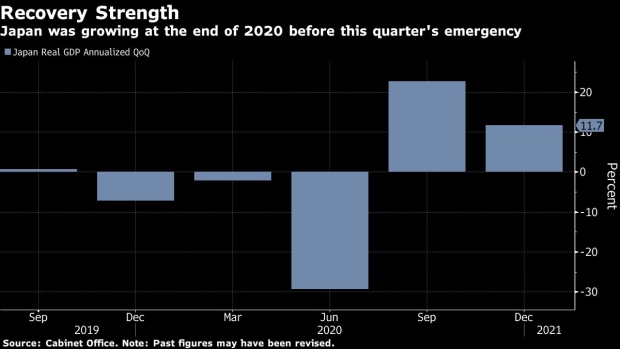Mar 8, 2021
Japan Confirms Double-Digit Growth at End of Pandemic 2020
, Bloomberg News

(Bloomberg) -- Japan confirmed its economy grew by double-digits at the end of last year, according to revised data that continued to show strength even as this quarter’s virus emergency sets back the recovery for the time being.
Gross domestic product grew an annualized 11.7% from the prior quarter in the three months through December, the Cabinet Office reported Tuesday in figures that were a touch weaker than an earlier estimate. Economists had forecast a revised growth rate of 12.6%.
Separate reports showed household spending fell at the start of the resumed emergency by a worse-than-expected 6.1% in January from a year earlier.
Key Insights
- Confirmation that the economy grew at a double-digit pace for a second straight quarter largely bodes well for the country’s recovery prospects after emergency measures to contain the virus are fully lifted.
- The economy is seen shrinking this quarter amid restrictions that have led to weeks of reduced hours at bars and restaurants in major cities. Prime Minister Yoshihide Suga last week extended the emergency through March 21 for the Tokyo region to better contain the virus after almost two months of improvement.
- January’s drop in household spending is one sign of the fallout from the emergency. Ongoing wage drops also suggest there’s a limit to how much consumption can improve even after restrictions end and Japan’s vaccine drive, which only started in mid-February, picks up pace.
- The Bank of Japan is scheduled to wrap up a policy review next week to make its monetary easing sustainable over the long haul, given that inflation looks set to stay below the BOJ’s stable 2% target for a long time.
What Bloomberg Economics Says...
“Looking ahead to 1Q, we expect a sharp decline in GDP as a result of the latest state of emergency ... When it’s lifted, the economy could see another sharp pickup, propelled by pent-up demand and consumers with excess savings -- assuming the outbreak is brought under control in 1Q.”
-- Yuki Masujima, economist
For the full report, click here.
Get More
- On a non-annualized basis GDP grew 2.8% from the previous quarter, compared with a 3% expansion forecast by analysts.
- Nominal GDP expanded 2.3%. Economists had expected 2.5%.
- Private consumption increased 2.2% from the prior quarter, in line with the preliminary figure and a forecast by economists.
- Business investment rose 4.3%. Analysts had predicted a 4% increase, compared with the preliminary result of 4.5% after finance ministry capital spending data released last week came in weaker than expected.
- Inventories subtracted 0.6 percentage point from GDP, compared with a 0.4 percentage point subtraction expected by economists.
- Net exports of goods and services contributed 1.1 percentage point to non-annualized GDP growth. Economists forecast a 1 percentage point support in line with the preliminary estimate.
- Household spending fell 6.1% in January from a year ago. Economists had forecast a 2.1% drop.
- Labor cash earnings fell 0.8% in January, compared with a 1.7% loss forecast by analysts. Adjusted for inflation, overall wages edged down 0.1%.
(Adds more details from the release.)
©2021 Bloomberg L.P.